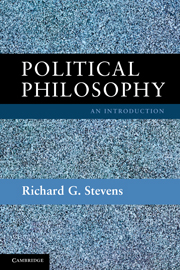Book contents
- Frontmatter
- Contents
- Acknowledgments
- Prologue
- Part I The Nature And Origin Of Political Philosophy
- Part Two The Problem Of Political Philosophy
- Part III The Permutations Of Political Philosophy
- 7 Ancient and Medieval Political Philosophy
- 8 A Kind of Betrayal
- 9 Modern Political Philosophy and Postmodern Thought
- 10 Ancients and Moderns
- Epilogue
- Index
7 - Ancient and Medieval Political Philosophy
Published online by Cambridge University Press: 05 June 2012
- Frontmatter
- Contents
- Acknowledgments
- Prologue
- Part I The Nature And Origin Of Political Philosophy
- Part Two The Problem Of Political Philosophy
- Part III The Permutations Of Political Philosophy
- 7 Ancient and Medieval Political Philosophy
- 8 A Kind of Betrayal
- 9 Modern Political Philosophy and Postmodern Thought
- 10 Ancients and Moderns
- Epilogue
- Index
Summary
Again we must pick a word apart. The word “history” is nothing more than the English descendant of the Latin historia which, in turn, is the cognate of the Greek word ἱστορία, that is, historia. Its meaning in both Greek and Latin is a narrative of “the things.” Things happen. The historian takes note of their happening. History is not the things themselves, nor, with one possible exception, did anyone in the West prior to the eighteenth century see any rational system to the sequence of those things. This or that written or reported history has some meaning, and surely one historical event alters the landscape such that prudent men can make reasonable estimates of other events which might follow, but, absent reference to divine providence, the overall sequence of things was not thought to be discernible. Things happen. That is all. History is the inquiry into or the narrative about things that have happened. At some point in time the word “history” came to be used to delineate the sequence. History became reified. It became itself a thing. Of all the strange things imaginable, it came to pass that, as in the title of a book by Hegel (1770–1831), we find someone speaking of the Philosophy of History. If, as we said, philosophy is the pursuit of the truth about things, then the “philosophy of history” would mean the discovery of the truth about that sequence. Hegel states it straightforwardly this way: “the history of the world, therefore, presents us with a rational process.” To say when this notion of history as a thing itself, as a process, rather than as an inquiry into or narrative of things, came into being is itself a historical question. It will be most convenient to defer that question for yet two more chapters.
Speaking of the “history of philosophy” and so, of the history of political philosophy, is, of course, different from speaking of the philosophy of history. Whereas one may doubt that history has “meaning,” there is no doubt at all that there can and must be some inquiry into and narrative of the several political philosophers. The problem is that the notion that there is a “historical process,” when applied to the things of philosophy, may lead us astray. The problem of the philosophy of history thereby intertwines with the problem of the history of philosophy.
- Type
- Chapter
- Information
- Political PhilosophyAn Introduction, pp. 151 - 187Publisher: Cambridge University PressPrint publication year: 2010



